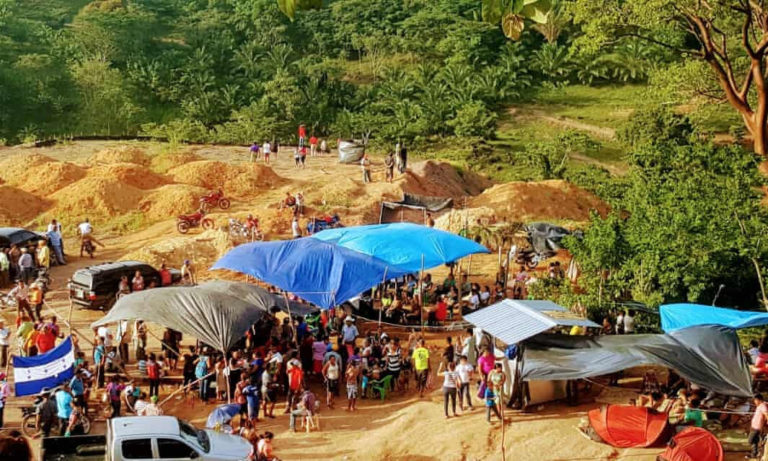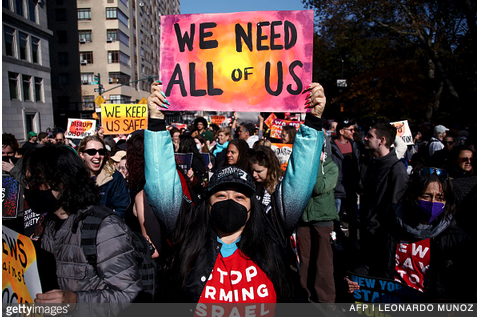by Jim Phillips
If Agnes Baker Pilgrim (Grandma Aggie)—Takelma spiritual leader, well-known and revered resident of the Rogue Valley, and international water defender—were walking the earth today, I think she would be standing in solidarity with the people of Guapinol.
Guapinol is a community in the north of Honduras at the center of an area where people are mostly small farmers (campesinos) who plant corn, beans, a few other crops, and tend cows. Some also work on nearby fruit or palm oil plantations. Their way of life is not easy, but it is dignified and largely self-reliant, as long as they have access to their land and rivers. Several rivers in the area provide the water people need and have long used for their crops, their animals, and their domestic needs.
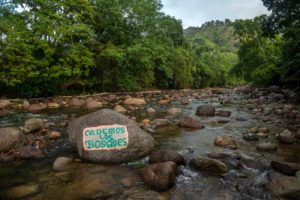
Guapinol is in the Bajo Aguán, an area where conflicts over land and resources are frequent, often violent, and sometimes deadly. Large landowners, foreign companies, the police and the military expel small farm communities from the land to make way for the expansion of large-scale extractive industries like mining, that has been the basis of the government’s economic development plan. But Guapinol is adjacent to the Carlos Escalante National Park— a legally protected environmental reserve—that is a source of some of the waters on which the communities depend. Because of this, some Hondurans thought the Guapinol community might just, somehow, be safe from becoming the target of mining companies and hydroelectric projects promoted by the Honduran government. They were wrong.
In 2013, the Honduran Congress passed Decreto Legislativo 252-2013, permitting the government to award concessions for mining and logging in the Escalante Park. The government awarded a mining concession to Los Pinares Mining, part of Grupo Emco, a conglomerate owned by Lenir Perez and Ana Facussé, one of the richest and most politically powerful families in Honduras. Emco advertises itself as entirely Honduran, but is registered offshore in Panama. Los Pinares also has other mining concessions in Honduras that have been a source of concern and dislocation for other rural communities.
The Los Pinares project involves open pit iron ore mining that can be especially destructive on the environment. Mining operations use and contaminate enormous amounts of water and soils with heavy metals and toxic chemicals, and destroy the vegetation that prevents erosion and is used to feed animals. People in Guapinol said that neither the government nor the company consulted the communities beforehand to provide full information about the proposed mining operations and to obtain the free and informed consent of the people to proceed—the consulta that is required by law. This was not the first time that Honduran communities had made such a complaint.
Since, in the perspective of many Guapinol residents, the company and the national and local governments did not offer a proper consultation, the communities themselves organized and conducted a cabildo abierto, a large open community meeting in 2018, after months of fruitless negotiations with the company and the government. As might have been expected, the more-or-less democratic and participatory community meeting expressed strong rejection of the mining operation, and the people declared their communities to be a mining-free zone. Near the Los Pinares mining site, they also formed an “encampment for water and life.”
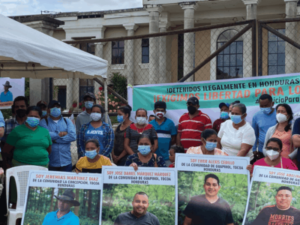
The Honduran government, bent on expanding and protecting mining projects, arrested dozens of Guapinol residents, ultimately freeing all but eight whom they charged with conspiracy to commit a crime, illegal occupation of land, and arson. The arson charge stemmed from the burning of a truck, but no evidence showed that any of the “Guapinol Eight” were responsible for the fire. The charges turned what should have been a civil negotiation between company and community into a criminal case against the Guapinol eight, known as the water defenders. The eight were sent to high security prisons far from their homes and detained there for months without due process.
Guapinol has become an international incident, emblematic of the sort of thing that goes on all over Honduras and in many other areas of the world, including the United States and Canada. Public pressure did succeed in getting the defenders moved to lower security prisons closer to home, but the Honduran judicial system refused to release them to await trial. The eight Guapinol water defenders have been in prison for more than two years. To many Hondurans, the case represents the government doing the dirty work of companies and powerful families, instead of protecting the rights of communities and the environment.
Lawyers for the Guapinol defenders have filed several habeas corpus motions, demanding that the Guapinol eight be released from prison pending trial. The courts have denied these motions. In Honduras, judges are very often bribed or threatened to rule in ways favorable to the government or the corporations. Some judges themselves attest to and condemn this corruption. Many Hondurans and some international observers believe that keeping the Guapinol defenders in prison for so long is simply a way of warning others of the consequences of trying to defend their rights and the environment.
In the past few weeks, the trial of the eight Guapinol defenders has finally proceeded, despite frequent stalling and delays. Independent reporters indicate that, so far, the witnesses for the prosecution have been unable to identify the Guapinol defenders as perpetrators of the alleged crimes. There are also apparent contradictions in the accounts of various witnesses. The government prosecutors have resorted to the use of “protected” witnesses, a category that allows the admission of a testimony without identifying who is testifying. The government prosecutors claim that anonymity for some of their witnesses is necessary because they could be (or are) threatened by supporters of the Guapinol defenders and their community. But lawyers for the Guapinol defenders say this practice, allowed by the judges in this case, undercuts any ability to adhere to standards of evidence and personal responsibility, and allows prosecution witnesses to commit perjury without consequence.
There are reports that the mining company, Los Pinares, has been engaged in surveillance of supporters of the Guapinol eight and the community.
“There is evidence that this company (Los Pinares) has submitted the people and their defenders to surveillance that began in August, 2018 and probably continues to the present,” defense lawyer Carlos Jimenez said recently. In Honduras, surveillance is often part of a campaign of dissuasion or harassment, and sometimes the prelude to physical attacks or police actions against those under surveillance.
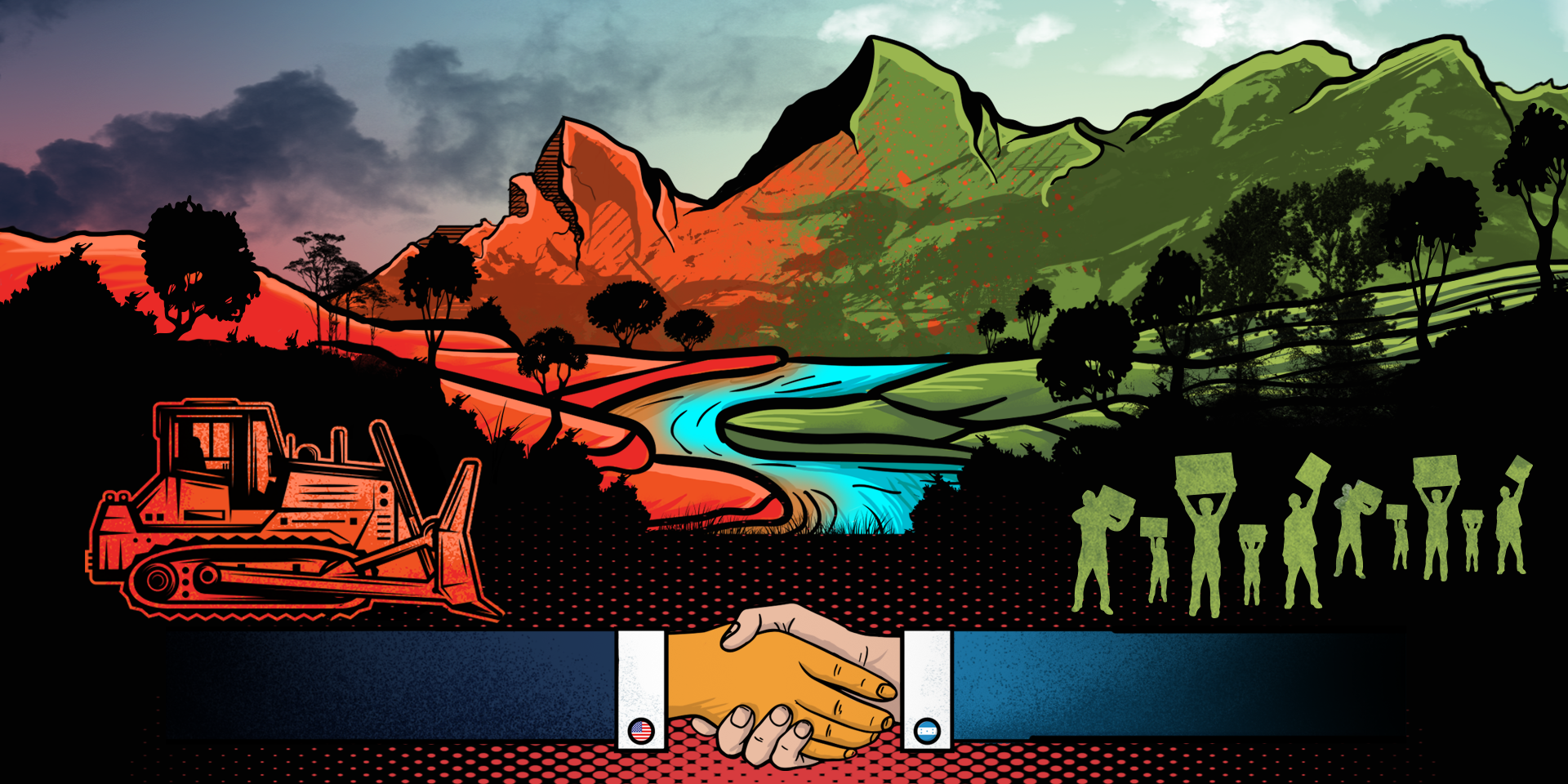
The defense in the Guapinol trial has not yet begun. No one knows for certain how long the trial will last or whether the Guapinol water defenders will be found innocent and freed. The outcome will be a cautionary tale, but for whom? The defenders of rights and environment? Or those who indiscriminately violate rights and environment?
On January 27, Honduras will have a new president and a new government that has openly committed itself to defend the rights of local communities like Guapinol against the predations of extractive corporations. The new government has widespread popular support, but after more than a decade of the outgoing government’s promotion of rampant abuse and entrenched powerful interests in the status quo, the new government faces huge obstacles to change. In the past two months since the election, corporations—with the aid of the police and military and the blessing of some courts—have continued unabated in ignoring the rights and peaceful protests of communities elsewhere in Honduras.
For example, in the western Honduran community of Azacualpa, Canadian mining company Aura Minerals has been digging up the ancestors’ bones in the community’s graveyard to mine the area for gold. Azacualpa residents are deeply offended by what they regard as a sacrilege against their families and their community. Last week, as military units arrived to protect Aura Minerals’ exhumations of the graves, the Azacualpa community resorted to blocking access to the graveyard. There is concern that local community members may suffer the fate of the Guapinol defenders. The image of a foreign company invading a cemetery in order to extract gold with the support of local authorities and the military sends a clear message that in a world where the frantic extraction of resources is the order of business, nothing is sacred—neither the rights and well-being of the living nor the peace of the dead.
Hondurans and international solidarity supporters have set up an encampment near the courthouse where the Guapinol trial is underway. Their presence is a constant reminder that people will not abandon the struggle for human rights and the integrity of the environment.
The SHARE Foundation in Berkeley, California is one of the U.S. organizations offering support for this encampment. It has sponsored small delegations from the U.S. to visit the Guapinol community and the encampment, and the group raises funds to support some of the logistical needs of the encampment.

